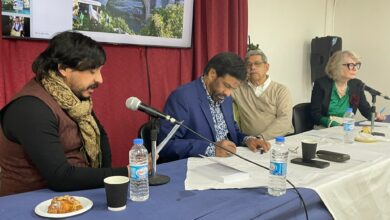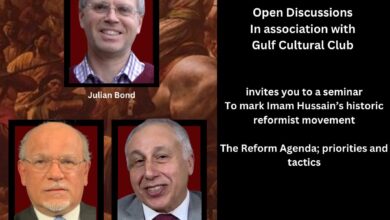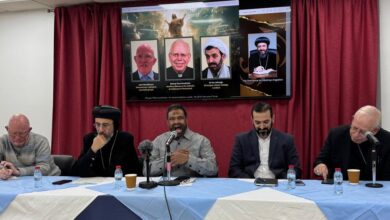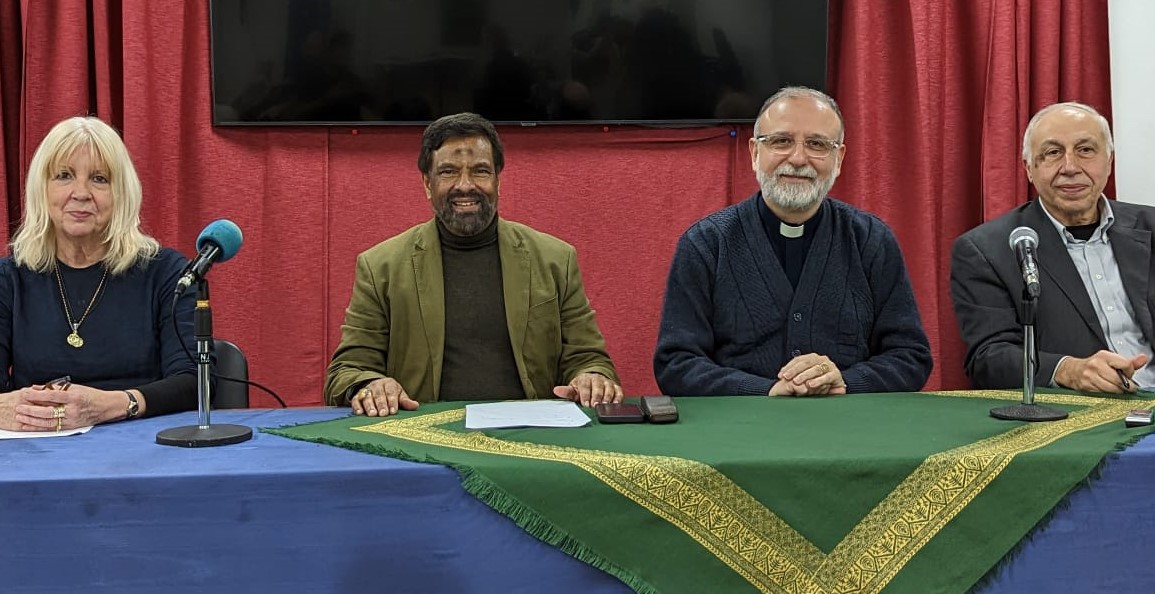
Jesus and the other: The art of engagement
As part of the Christian world prepares to mark the birth of Jesus, the occasion is best served by grasping his approach to others. This is significant for the portion of dialogue, reason, mutual respect, and peace. He never controlled or manipulated others to agree; instead, he asked questions and invited others into conversation to help them see where they stood in relation to him. The art of engagement is what has been lacking in the world. Conflicts, wars, and unilateralism are symptoms of this. To achieve a better world, Jesus endeavoured to disseminate good behaviour and promote the art of engagement.
Lindsay Fulcher: About 30 years ago I was talking to a very wise woman about how awful someone was,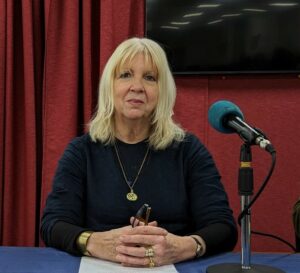 what they had done, what they had said, it was all their fault etc.. etc, on and on – when, suddenly, she put a stop to my tirade with one witty, succinct, perfectly timed comment. ‘Oh,’ she said, looking at me directly, with a kindly twinkle in her eye, ‘the dreaded other!’ Her remark was funny and profoundly serious at the same time. It was as if she has held up a mirror to me and a microphone too, and I suddenly saw and heard myself blaming someone else for everything! You hear quite a lot of this nowadays…
what they had done, what they had said, it was all their fault etc.. etc, on and on – when, suddenly, she put a stop to my tirade with one witty, succinct, perfectly timed comment. ‘Oh,’ she said, looking at me directly, with a kindly twinkle in her eye, ‘the dreaded other!’ Her remark was funny and profoundly serious at the same time. It was as if she has held up a mirror to me and a microphone too, and I suddenly saw and heard myself blaming someone else for everything! You hear quite a lot of this nowadays…
‘The dreaded other!’ I screeched to a halt and shut up and even now, sometimes, if I am ranting and raving about someone or something, I remember her comment and stop mid-flow. ‘The dreaded other’! So, who or what is the ‘Other’? And another question – why should they be ‘dreaded’?
‘The other’ is defined as an individual who is perceived by the group as not belonging, as being different in some fundamental way.’ They are not like us, they are not ‘normal’. They stand out in a crowd. They don’t fit in. They may be aliens, if not from another planet, then from another country, they might be foreigners. They might look different from us. They might dress differently. They might speak differently and so on and so forth. And they might have a different religion.
One thing is for sure, they are not like us. It is a case of ‘them and us’ and we might not understand them and, if we don’t understand them, we might fear them. And so they become ‘the dreaded other’! And if we fear them, we might want to get rid of them, by one means or another. You see where this desire for separation is going – to suspicion, to enmity, to hostility, to violence, to war: so mind the gap!
Then, this chap comes along – no, not Che Guevara! We all had this poster up on our walls in the sixties… but I have included it here to show you how Che’s appeal was marketed by this Christ-like image. Of course, it can work the other way around too – with Jesus being seen as a counter-culture revolutionary which, in a way, he was. He broke all the rules, and set people free and this upset the authorities, so much so that he became ‘the other’ and they had to get rid of him.
Jesus was not interested in the earthly goals that most of us set ourselves. He did not want or respect wealth or power, or the social standing it gave to certain individuals. He was not ruled by the ruling classes – be they social, religious, military, or monetary. He did not play the game by the normal rules and, rather than spurning or persecuting the other, he tended to embrace them.
Now to say that the Jews and their near neighbours, the Samaritans, did not get on is an understatement. They were, as we say, sworn enemies. So, what does Jesus do? He tells the story of the good Samaritan in which someone who should be his enemy comes through as the hero, the good guy who stops on the road and helps the stranger, who has been robbed and beaten and left for dead; while the Jewish priest and Levite, who pass by without pausing, are cast as the villains of the piece. Unusual? Yes. Provocative? Yes. In fact, he’s asking for trouble…
Next, even worse, Jesus, himself, actually talks to a Samaritan woman at Jacob’s Well (John 4) and, not only that, he flaunts the strict rules of ritual purity by asking the woman (she who was considered unclean and definitely other) to draw water from this historically important well for him. This is a kind of divine water-cooler moment in which Jesus engages a woman he happens to meet in everyday chat and then does the big reveal.
The apostle John tells the story:
(Jesus) came to a Samaritan city called Sychar, near the plot of ground that Jacob had given to his son Joseph. Jacob’s well was there, and Jesus, tired out from his journey, was sitting by the well. It was about noon. A Samaritan woman came to draw water, and Jesus said to her, ‘Give me a drink.’ (His disciples had gone to the city to buy food.) The Samaritan woman said to him, ‘How is it that you, a Jew, ask a drink of me, a woman of Samaria?’ (Jews do not share things in common with Samaritans.) Jesus answered her, ‘If you knew the gift of God and who it is that is saying to you, ‘Give me a drink,’ you would have asked him, and he would have given you living water.’ The woman said to him, ‘Sir, you have no bucket, and the well is deep. Where do you get that living water? Are you greater than our ancestor Jacob, who gave us the well and with his sons and his flocks drank from it?’ Jesus said to her, ‘Everyone who drinks of this water will be thirsty again, but those who drink of the water that I will give them will never be thirsty. The water that I will give will become in them a spring of water gushing up to eternal life.’ The woman said to him, ‘Sir, give me this water, so that I may never be thirsty or have to keep coming here to draw water.’ Jesus said to her, ‘Go, call your husband, and come back’. The woman answered him, ‘I have no husband’. Jesus said to her, ‘You are right in saying, ‘I have no husband, ‘for you have had five husbands, and the one you have now is not your husband. What you have said is true!’ The woman said to him, ‘Sir I see that you are a prophet. Our ancestors worshiped on this mountain, but you say that the place where people must worship is in Jerusalem.’ Jesus said to her, ‘Woman, believe me, the hour is coming when you will worship the Father neither on this mountain nor in Jerusalem. You worship what you do not know; we worship what we know, for salvation is from the Jews. But the hour is coming and is now here when the true worshipers will worship the Father in spirit and truth, for the Father seeks such as these to worship him. God is spirit, and those who worship him must worship in spirit and truth.’ The woman said to him, ‘I know that Messiah is coming’ (who is called Christ). ‘When he comes, he will proclaim all things to us.’ Jesus said to her: ‘I am he, the one who is speaking to you’.
Quite a moment! This woman is ‘other’ in so many ways. First of all, she is a woman, secondly, she is a Samaritan, and, thirdly, she is, to say the least, a bit on the wild side with pretty loose morals and five husbands, plus a boyfriend, to prove it! Bad, bad, bad, and yet…
Jesus seemed to be drawn to outcasts of all kinds: not just loose women and prostitutes but others on the edges of society or cast out altogether – lepers, the lame, the maimed, the insane, the crippled, the possessed, and others deemed unclean – even the dead!
Here he is casting demons out of a man possessed. This is a well-known story – the demons passed into a herd of swine who then threw themselves into the water and drowned. The pigs here seem to know what is coming and look rather reluctant to plunge to their deaths!
The other story involving swine is the one Jesus tells of the Prodigal Son in which a man has two sons whom he treats equally. One stays at home and works hard as a dutiful son; the other leaves, squanders all his money fecklessly, and ends up down and out and sleeping in a pigsty. There, he suddenly comes to his senses and decides to go home and ask for his father’s forgiveness. His delighted father goes out to meet him, welcomes him back and forgives him, and orders a feast to be prepared to celebrate his homecoming. The other son is not best pleased.
Here is a wonderful image by Pieter Brueghel the Elder (the original is in the Courtauld Gallery). In it, he depicts the story of how Jesus deals so deftly with a question of morality, one that still may bother us today:
Now early in the morning he came again into the temple, and all the people came to him, and He sat down and taught them. Then the scribes and Pharisees brought to him a woman caught in adultery. And when they had set her in the midst, they said to him, ‘Teacher, this woman was caught in adultery, in the very act. Now Moses, in the law, commanded us that such should be stoned. But what do you say?’ This they said, testing him, that they might have something of which to accuse him. But Jesus stooped down and wrote on the ground with his finger, as though he did not hear.So when they continued asking him, he raised himself up and said to them, ‘He who is without sin among you, let him throw a stone at her first.’ And again he stooped down and wrote on the ground. Then those who heard it, being convicted by their conscience, went out one by one, beginning with the oldest even to the last. And Jesus was left alone, and the woman standing in the midst. When Jesus had raised himself up and saw no one but the woman, He said to her, ‘Woman, where are those accusers of yours? Has no one condemned you?’ She said, “No one, Lord.’ And Jesus said to her, ‘Neither do I condemn you; go and sin no more.’
Again, Jesus is put on the spot in the midst of what the religious authorities see as a moral dilemma, and again, he engages them with very few words and provides an elegant non-violent solution. Extending the concept of the Other to the dead is extreme but here we see Jesus raising Lazarus and we remember that even when he, himself, is dying on the Cross he still engages with one of the thieves crucified alongside him and gives him the promise of paradise. Now I want to speak briefly about Jesus as the ultimate Other. If, as Christians, we believe he was fully God and fully Man, then he cannot help but be Other and the many miracles he performed point to this. But here, in this icon we see the full glory of his Otherness, Jesus fully manifested as Christ. Talking to Moses and Elijah outside time and space and no longer in an earthly body but in a dazzling celestial body, shining brightly, so brightly that the three disciples, who followed him up Mount Tabor, cannot bear more than a glimpse of this unearthly vision. They fall back in wonder blinded by the light.
Over the centuries in many religions, the body has had a bad press. At best it is seen as a distraction; at worst, as wholly sinful, a dark, unruly, animalic entity that must be tamed, subdued, and mortified, the very enemy of prayerfulness, contemplation, and enlightenment.
And yet here at the centre of the Christian Mass are these extraordinary words: ‘This is my body given for you… do this in remembrance of me’ As we partake of the bread and wine we re-member, we become members of the Body of Christ. ‘Though we are many, we are one body…’ Somehow, we are mystically woven back together and, in this Divine Body, we are One and there is no Other. Amen.
Revd Nadim Nassar: It is a pleasure to be here. Thank you Dr Shehabi for inviting me again. It is a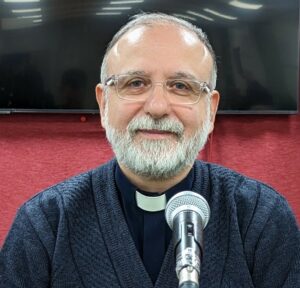 very wide subject to talk about the other. Thank you Lindsay for this survey of who the other could be or would be. I would like to focus more on one aspect of the other and the art of engagement that Christ took and embraced.
very wide subject to talk about the other. Thank you Lindsay for this survey of who the other could be or would be. I would like to focus more on one aspect of the other and the art of engagement that Christ took and embraced.
If we believe as Christians that Jesus Christ was fully God and fully human we also believe that God in himself is a trinity. As we are approaching Christmas we are celebrating as Christians the second person of the trinity the son. And we see that throughout Jesus’ life he called Godfather. This God and a community are for us humans the ultimate other.
What does it mean the ultimate other? Ultimate other because he created us in his image. What does it mean he created us in his image? His image is the trinity, the community. We are not meant to live individually. We are not meant to live separately. The image of God that we share in the Christian faith, the Moslem faith, and the Jewish faith is that all of us were created in God’s image. This is the image of being together. It is the togetherness. It is exactly what Christianity believes. God in himself is a community and this community is a trinity.
I am not going to speak about the theology of the trinity which can go on and on but I want to speak about is a specific point. This point is the emphasis of the trinity. In this community, God and the community there is an essence which is unity and that unity is love. And this unity is the unity of love.
So God is a community united in the spirit of love. And the relationship between the father the son and the holy spirit is unity which is the essence of God and that is love. So when God decided to come to us, the ultimate other, decided to be one of us, that has consequences and one of the most important consequences is that God accepted our limitations. He accepted to be like us in everything.
So in Jesus we see that Jesus laughed, cried he had pain was betrayed, he had friends and family. He experienced everything that we experience as human beings and ultimately he faced the ultimate ordeal which reminds us of our limitations and reminds us of our mortality – death.
So when God engaged with us he engaged with us from his essence. So God was not different, when he came to us and became one of us he did that simply because he loved us and that love was the basis of the art of engagement of God with humanity.
God is the creator and God created us, the creation embraced that child, the Godchild out of the overflowing love of God for humanity. I am very aware that for Islam and for Judaism God is transcendent and this transcendence of God – we say in Arabic Allah tehala and it means God is transcendent. In Christianity when God wanted to engage with us he engaged out of his overflowing love and took the form of a human body- the limitations of time and space – out of the very love that God has for us.
And Jesus Christ in his life did not engage in anything else other than love. So love is the essence of the culture of that trinity. The trinity has a culture and the culture of the trinity is the interaction between the father, the son, and the holy spirit, eternally and that interaction is the interaction of love. And when God came to us in the form of a human, a man, this man engaged with us and brought the culture of love.
He wanted us to learn that also humanity as a community cannot interact with each other from the same departure point which is love. Because of that, the art of engagement of Christ came to teach humanity to learn from God and the trinity how to live with each other in love.
So anything we do or anything we say which contradicts or harms or goes against the culture of love, the culture of the art of engagement of God is harming the creation and harming our relationship with God.
So there are many examples that Christ gave us of engaging with all the communities on earth like the Samaritans who were considered the enemy so he engaged with the enemy. So Jesus would not go around Sum aria as the Jews did in his time. He went through Sumeria. That challenged that kind of engagement and told us that there is no area that would be outside the area of engagement. So he challenged the political and religious establishment in his own time when he broke the rigid borders between Judea and Sumeria and went through Sumeria.
So the engagement with Samaritan women reflects the challenge that Jesus brought to us that any kind of borders we have between human communities, those borders are against the dignity of humanity and against the dignity of God. The art of engagement with God and between God and humanity is to break borders and to break barriers. So Jesus broke all barriers and all borders: a man talking to a woman and Jew talking to a Samaritan. Every kind of barrier that society knew, Jesus broke.
On the level of the enemy he deleted, he cancelled anything called enemy. So in another engagement, he engaged with the outsiders, the Jews used to call the outsiders the Gentiles. The Gentiles mean outsiders who are not Jewish. So he met a Phoenician woman, and a Syrian woman and she spoke to him and asked for his help. And his disciples wanted him to dismiss her. Peter said why don’t you send her away. She is so annoying. She is following us everywhere. And he turned to her and said to her this incredible sentence that until today is a mystery about how we understand the life of Jesus.
He said it is not good to throw the bread at the dogs. It is not good to throw the bread of the children to the dogs. So the bread of the children who are the Jews and he is the bread, to the Gentiles because the Gentiles were unclean for the Jews and they are out. So Jesus came to also break the barriers and challenged this woman but saying it is not good to throw the bread of the children to the dogs.
The Western theologians do not know exactly the culture in Syria and they try to defend Jesus and say that he did not mean to hurt her. He meant puppy dogs. They say strange things to defend Christ in this story. Actually, Christ does not need any defense. He meant it when he said you are a dog. And she replied yes master. Even the dogs eat from the crumbs of the table that fall from the masters. It is amazing. This broken woman who is asking Jesus to heal her daughter accepted not only to be a dog but to dream like a dog and Jesus said to her “woman great is your faith, go and get what you want.” And her daughter was healed.
So why did she hurt her first? He hurt her first in order to teach the disciples next to him a lesson. A lesson that nobody is an outsider. When she said yes even the dogs eat from the crumbs Jesus said yes. He told his disciples that this is the faith and the faith is not limited to any religion, to any ethnicity, any border, any country to any human being. Faith is the manifestation of the relationship that we have with God.
And finally, I want to give you the ultimate engagement. How God engaged with one of us in the incarnation, the Christmas story in being one of us. This is engagement with God through loving his enemy and on the cross he looked down from the cross and said God, father forgive them for they know not what they are doing.
He forgave the enemy, the strangers, the criminals, he forgave out of love even to his last breath on the cross. He wanted to teach humanity that an engagement with God has one essence only and this essence is love.
So when we engage with each other when we try to build relationships with each other as societies, communities, individuals whatever and when we erect barriers when we strengthen borders, when we highlight individualism we are hurting the heart of God. God engages with us in every single bit of our existence. He engages with us in love.
Because of that loving the enemy, praying for those who persecute us, and loving those who hurt us is hard. I am not saying it is easy. In this case, love is not an emotional feeling. Love is an active, dynamic love towards the enemy that you can destroy the enemy but you chose to help instead of destroying. This is love, the love that shows the quality of God is the art of engagement based on the heart of the trinity that shows love.
Dr Laith Kubba: Allow me to cruise through a number of observations and thoughts from a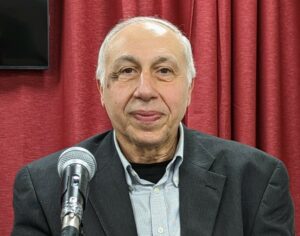 perspective that is different of course from that of the other speakers and is different from that which is commonly discussed amongst Muslims.
perspective that is different of course from that of the other speakers and is different from that which is commonly discussed amongst Muslims.
Let me just add a small footnote. After a long journey in various activities both faith-based political and others, we have developed at the Quran Education Foundation an approach and a perspective that addresses the issue of faith, science, contemporary living, and the challenges of globalisation. We are trying to develop concepts in a way that we can address these issues in a way that is meaningful and effective.
As I speak to my children and grandchildren in this world where what seems to be faith and religion is irrelevant. Is it really irrelevant? How can we approach it? So the approach is not simply narrating what traditional schools of religion and historical records or arguments show but trying to really bring it to life to date with all the challenges and slightly different perspectives. And of course, what better topic to address this other than to try to reflect on Christmas, on the birth of Jesus Christ, and to look at it from this angle and with this perspective? So it really is a great opportunity.
I want to make it relevant as I said. We just finished the World Cup. I think half of the world’s population was watching football and what is happening. Everybody knows who Messi is.
And another event that should have captured our attention. It certainly captured my attention that the images that are coming back from the James Webb telescope are telling us about the universe its vast galaxies and the theories about dark matter and dark energies. Not only how huge this universe is but the unseen world which we in. In Arabic, it is called raib. It exists. And the divine, the absolute behind all the absolutes. Beyond our capacity to imagine God. Behind this raib, this physical world, and the unseen dark matter.
And the third thing which I want to bring to the table is a person, a man who more than half of the earth’s population believes in. His message and his character is unique. That is Jesus. I say more than half of the world’s population because the Muslims and the Jews believe in the unique feature and the unique character irrespective of the different narration that they have there is something very core that is shared about his unique presence in history and his unique impact.
In particular, I want to focus on the unique impact of Jesus and I want to put it in context. The perspective that I have at the Quran Education Foundation is to look at social sciences and sciences as part of our angle and look at the Ibrahamic faith in particular and the text that we have in the Quran and to look at the trajectory of human civilisation not only today but where it is going.
So what is so unique about Jesus? Of course, those who have faith, the Muslims and the Christians believe in the divine conception that there is divine intervention in the creation of Jesus and divine intervention has created a lot of arguments in the Christian world between the Catholics and the Orthodox as to the nature of Jesus. In the Muslim world, it is clear cut, from the verse in the Quran: Jesus is like Adam by divine intervention that created these phenomena.
The Bible and the Quran try to convey a message that there is something very special about us humans and in that respect what makes Jesus so special today? The trajectory is relevant and important because of what Jesus represents.
In the 20th century with the arrogance (when confidence exceeds its limit it becomes arrogance) of us humans science is reaching everywhere, we are controlling the earth, we thought we are masters of our destiny. This became an extension of materialism, pure rational thought. I think there is one school of thought. It is a novelist who wrote the book Atlantis Shrugged. It is Ayn Rand and argued fully that the only value that exists is rational selfishness and everything else is just nonsense.
And this is the extreme opposite view of the message of Christ and the trajectory is that it is at one extreme and there is no other. There is only the self and the self-interest, the materialism and advancing that self-interest. There is no chief executive in the world’s major organisations who have not read that book and is more or less guided by that philosophy.
It is real danger if we pursue the school of thought that says materialism and nothing else. Absolutely at the other extreme we have a call for unconditional giving, unconditional forgiving. We have the belief in the divine and that judgement should be left to God and the concept of mercy and love that Al Rahman, Al Rahim in Arabic. That is the translation that we have that God’s connection to the universe – the seen and the unseen universe – is through that connection.
And in the evolution of humans on earth, their task is to manifest the Muslim heritage. In the Muslim heritage, we say that God is the most knowledgeable, and the most merciful and it is our task to demonstrate those attributes of God in our actions and in our lives. Those who have no mercy in their hearts, their actions. The more you have of those attributes the more you manifest God.
And in that respect, the act that Jesus had demonstrated not only in what he preached but in acting it fully to the very last minute is a manifestation of what Allah wants of humans. By human nature we are selfish we are jealous, we like to possess things and we like to elevate our human nature beyond that.
I have to put this in the context of the other Ibrahimic faiths and then maybe in the context of all other religions. In the Ibrahimic faith including the Muslims, we believe that Adam was the first intervention. Maybe there were other homosapiens but certainly, us who built civilisation came through intervention and we are tasked to be God’s custodians on earth and to manifest God’s will and message through our societies and our actions. It is a long journey. And for that purpose gradually incrementally God intervened and sent messengers.
Noah is the first one who basically introduced the concept of God and not all these little idols and powers in nature that were worshipped. Then through Ibrahim God is abstract. God is not a person he is abstract and that was a huge step forward. The biblical stories are the same with different narrations. But that concept was an advancement. Then through Moses there came the intervention that there are rules – the ten commandments. If you have that faith in God then some rules follow. Maybe there were to many rules and the essence of those rules was lost. So much formal religion and having custodians over religion making it not about God but just blind dead rules. And then came the shift when the message of Jesus gave such an emphasis on values because they are not the default of human nature. They are an indication of what human nature is. Values are an elevation of human nature. Left to our own rational instincts we all become selfish.
You can have a religious person who maybe finds comfort in worshipping even a little idol and thinking about what happens after death. But definitely, you cannot build a prosperous society without values. You simply cannot. If we left our materialistic and natural tendencies to rule then we have no values and no future other than self-destruction.
So introducing that dimension is unique. What is it that drove that connection to Jesus over 2000 years and over the globe? Is it just religion? Is it just the church? All religions have traditions and formalities and narratives to maintain the momentum
But I believe Jesus is far bigger and above that formality of the church and the tradition and the story. There is something very core in sync with human nature individually and collectively. And it can be brought to light and I think that is the real contribution that we can see in Jesus.
Today more than ever before I think the church and the different schools of thought have their own battles to worry about. But today and tomorrow as humanity steers its path towards the future it needs a compass, it needs those values and for the younger generation (this is what we try and do at the Quran Education Foundation) is to give them a narrative that will show them the real values of those messages and integrate this nicely with the 10,000-year evolution of human civilisation on earth, the challenges it is facing and of course with the sciences. We cannot detach that from the sciences, including the social sciences.
Of course, some people may argue that faith is faith. It is textbooks that we inherited and we do not question them understandably. But what we have inherited we respect but it is going to be extremely difficult to sustain in the end and I would say dangerous because it will limit our vision, seeing through Jesus and seeing through the messages that came to us through other prophets.
We have people of faith and we have believed in Jesus. Different schools among Christians differ on different things Jesus came among the Jewish community and they have their own stories about him. They recognise him as a good man but with slightly different stories they do not recognised the story of the virgin birth. But we need to capture the essence. We need to advocate the essence and I do believe all of us are challenged by this and that is part of the message.
There are so many thoughts but I thought the least I can do is to sketch out a perspective on how to approach the topic and the details of which are many. We can elaborate through the discussion and on future occasions I would be more than glad to peruse this topic.
*Lindsay Fulcher holds BA (Hons) and was licensed as a Lay Minister in 2020. She is also a Church Warden at St John the Baptist Holland Road where she preaches regularly. She also preaches at a number of other churches including St George’s Campden Hill, St Mary Abbots, St John’s Notting Hill, St James Norland, and St Clements.
**Revd Nadim Nassar (born 1964) is a Syrian-British Anglican priest, who is the Executive Director and Founder of the Awareness Foundation. He established the Awareness Foundation in 2003 with Bishop Michael Marshall in response to the growing need to study the Christian faith in the context of the 21st century.
In 2018, Nassar’s first book, “The Culture of God”, was published by Hodder & Stoughton. In this thoughtful and engaging book,is a message of hope from what Fr Nadim calls “that region of the world that God chose to live in when he took human form.”
***Dr. Laith Kubba is the Director of the Quran Education Foundation (QEF). He was formerly director of international relations at the Al-Khoei Foundation in London, a global charity and faith-based endowment, and founded the International Forum for Islamic Dialogue (IFID), a London-based network of open-minded Muslim activists and intellectuals. He regularly contributes to global media talks on democratization in the Middle East and North Africa, Islam and democracy, and politics in Iraq. Dr. Kubba holds a B.A. from the University of Baghdad, Iraq, and a Ph.D. from the University of Wales, UK. He was a senior advisor to the Iraqi Prime Minister and a spokesman for the Iraqi government. He was also a senior director for the Middle East and North Africa programs at the National Endowment for Democracy.


